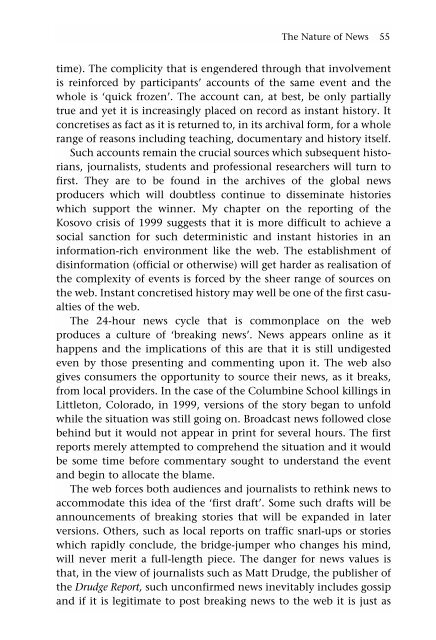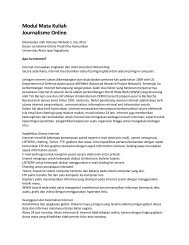Online Journalism - Ayo Menulis FISIP UAJY
Online Journalism - Ayo Menulis FISIP UAJY
Online Journalism - Ayo Menulis FISIP UAJY
Create successful ePaper yourself
Turn your PDF publications into a flip-book with our unique Google optimized e-Paper software.
The Nature of News 55<br />
time). The complicity that is engendered through that involvement<br />
is reinforced by participants’ accounts of the same event and the<br />
whole is ‘quick frozen’. The account can, at best, be only partially<br />
true and yet it is increasingly placed on record as instant history. It<br />
concretises as fact as it is returned to, in its archival form, for a whole<br />
range of reasons including teaching, documentary and history itself.<br />
Such accounts remain the crucial sources which subsequent historians,<br />
journalists, students and professional researchers will turn to<br />
first. They are to be found in the archives of the global news<br />
producers which will doubtless continue to disseminate histories<br />
which support the winner. My chapter on the reporting of the<br />
Kosovo crisis of 1999 suggests that it is more difficult to achieve a<br />
social sanction for such deterministic and instant histories in an<br />
information-rich environment like the web. The establishment of<br />
disinformation (official or otherwise) will get harder as realisation of<br />
the complexity of events is forced by the sheer range of sources on<br />
the web. Instant concretised history may well be one of the first casualties<br />
of the web.<br />
The 24-hour news cycle that is commonplace on the web<br />
produces a culture of ‘breaking news’. News appears online as it<br />
happens and the implications of this are that it is still undigested<br />
even by those presenting and commenting upon it. The web also<br />
gives consumers the opportunity to source their news, as it breaks,<br />
from local providers. In the case of the Columbine School killings in<br />
Littleton, Colorado, in 1999, versions of the story began to unfold<br />
while the situation was still going on. Broadcast news followed close<br />
behind but it would not appear in print for several hours. The first<br />
reports merely attempted to comprehend the situation and it would<br />
be some time before commentary sought to understand the event<br />
and begin to allocate the blame.<br />
The web forces both audiences and journalists to rethink news to<br />
accommodate this idea of the ‘first draft’. Some such drafts will be<br />
announcements of breaking stories that will be expanded in later<br />
versions. Others, such as local reports on traffic snarl-ups or stories<br />
which rapidly conclude, the bridge-jumper who changes his mind,<br />
will never merit a full-length piece. The danger for news values is<br />
that, in the view of journalists such as Matt Drudge, the publisher of<br />
the Drudge Report, such unconfirmed news inevitably includes gossip<br />
and if it is legitimate to post breaking news to the web it is just as
















